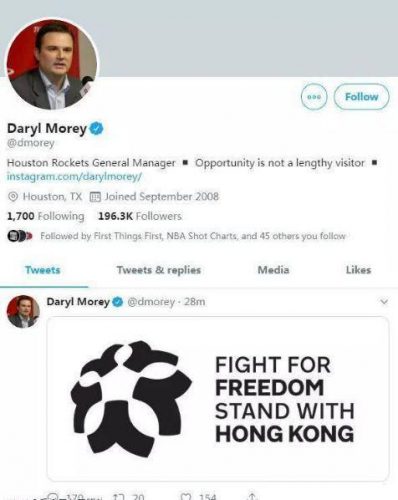I know, I know, the big news lately that everyone’s been paying attention to is the presidential impeachment investigation here in the US. But there actually is a lot of other news going on, including protests in Hong Kong about crackdowns on liberty by the Chinese government.
Want a quick update on the topic? The BBC News web site has a 100-word and 500-word summary to catch you up. Go ahead and read up, we’ll wait for you.
Ok, you’re back. So you would think that everyone in the USA would be all about standing strong with the Hong Kong protestors who want freedom from China’s totalitarian government, right?
Not so fast.
On Friday, October 4th, Houston Rockets General Manager Daryl Morey sent out what should have been a relatively uncontroversial tweet:
(In case you don’t know, the Houston Rockets had been the most popular NBA team in China because Chinese basketball star Yao Ming played for the Rockets at the start of the century.)
The tweet generated an immediate backlash from China. Chinese fans demanded that Morey be fired. The Chinese media company Tencent and many Chinese sponsors cut relations with the Rockets. Morey eventually deleted the tweet.
The NBA itself, issued the following statement hoping to sooth things over with China:
In short, instead of standing up for the Hong Kong protesters and for Morey’s tweet, the NBA was apologizing to the Chinese government. Which is interesting, given the woke reputation the NBA generally has on social issues throughout the United States. As columnist Jerry Brewer wrote in the Washington Post:
In simple comparison to other major American sports leagues, the NBA has acquired a reputation for progressivism that, while accurate, shouldn’t be taken too far out of its context…
That is not meant to minimize the laudable efforts the NBA has made to promote diversity, empower its employees to speak freely, champion gender equity and support gay rights. But it is a business above all, a multibillion-dollar powerhouse. While it has a heart and listens to its conscience, it is no less concerned with the bottom line than its peers. You cannot praise it as America’s most progressive sports league without acknowledging that is a tricky thing to be known for and a difficult reputation to uphold.
Eventually, NBA president Adam Sliver issued another statement saying that while the NBA valued it’s relationship with China, they would not be telling owners, managers or players what they could or could not say:
“It is inevitable that people around the world — including from America and China — will have different viewpoints over different issues. It is not the role of the NBA to adjudicate those differences. However, the NBA will not put itself in a position of regulating what players, employees and team owners say or will not say on these issues. We simply could not operate that way.”
The tweet and its fallout has had an impact on the NBA.
Chinese state TV cancels broadcasts of NBA preseason games – WaPo https://t.co/VHlBw47FAC
— RalphIsNow@rhanson40@threads.net (@ralphehanson) October 10, 2019
The immediate and strong Chinese reaction to the NBA soon started influencing major American media. Take for example ESPN. The Disney-owned sports network has been criticized for not discussing the politics of the controversy between China and the NBA. ESPN defended itself by simply saying that the network has a policy of covering sports and not politics.
ESPN faces criticism over its coverage of Daryl Morey tweet – CNN https://t.co/vQUOrslaLb
— RalphIsNow@rhanson40@threads.net (@ralphehanson) October 10, 2019
That policy at ESPN dates back to 2018 when new network president Jimmy Pitaro said that he wanted less politics and more sports on the network.
ESPN president wants less politics at network: ‘It is not our jobs’ – WaPo from 2018 // But when you are covering massive, global businesses, politics show up. It’s unavoidable. (Think back to MLK Day and Arizona Super Bowl)https://t.co/rJSkbw13H5
— RalphIsNow@rhanson40@threads.net (@ralphehanson) October 10, 2019
But avoiding politics when talking about taking North American professional sports to China is almost impossible. The mere act of showing a map becomes a political statement. Ignoring politics is by default a statement of support for the status quo.
Prime example of how simply showing a map on the screen is a political commentary. https://t.co/lrOLqWCUKy
— RalphIsNow@rhanson40@threads.net (@ralphehanson) October 10, 2019
Have you no shame @espn? This China pandering by @nba and their partners is absolutely pathetic. https://t.co/TUe4P9XQ3U
— Clay Travis (@ClayTravis) October 10, 2019
Remember how I mentioned that ESPN is owned by Disney? Disney has been working since 2004 at increasing its presence in China with sponsorship of the country’s first NBA games.
In the beginning, from 2004 – The Walt Disney Company Increases Presence In China With Sponsorship Of Country’S First NBA Gameshttps://t.co/pEkiVqo75y
— RalphIsNow@rhanson40@threads.net (@ralphehanson) October 10, 2019
And Disney has been working hard to appease China with its non-sports properties as well. The New York Times noted in an article from 2018 that the Ancient One in Doctor Strange moved from being a Tibetan lama to a Celtic mystic to avoid offending the Chinese government. That was a lesson Disney learned the hard way back in 1997 when the Brad Pitt movie Seven Years in Tibet and the Martin Scorsese movie Kandun ticked off the Chinese government.
How China Is Rewriting Its Own Script – How Hollywood has been appeasing (or offending) China for decades. Some context for the Disney/ESPN/NBA fuss over comments on China and Hong Kong protests https://t.co/GOqQe7Av5O
— RalphIsNow@rhanson40@threads.net (@ralphehanson) October 10, 2019
None of this pandering to China by sports teams and big US media is being done because they particularly support totalitarian governments. Instead, they are interested in doing business with more than 1.3 billion potential Chinese fans. And that is the real bias we see in American media – How can they make the most money.
And finally… NBA star LeBron James weighs in on the NBA/China controversy, on the side of China…

